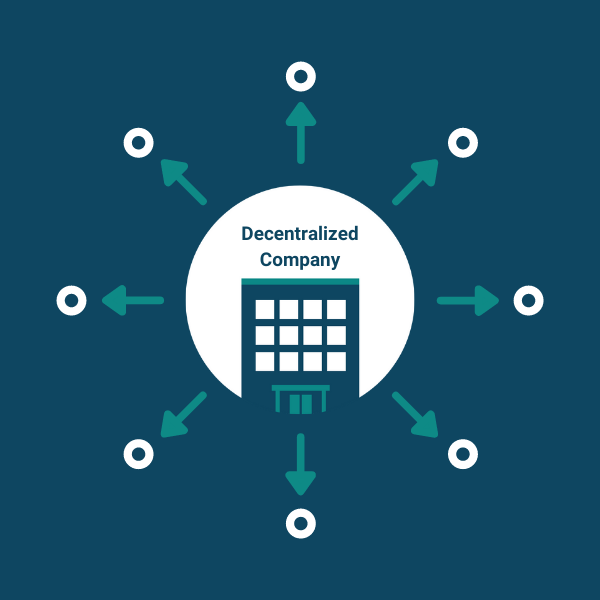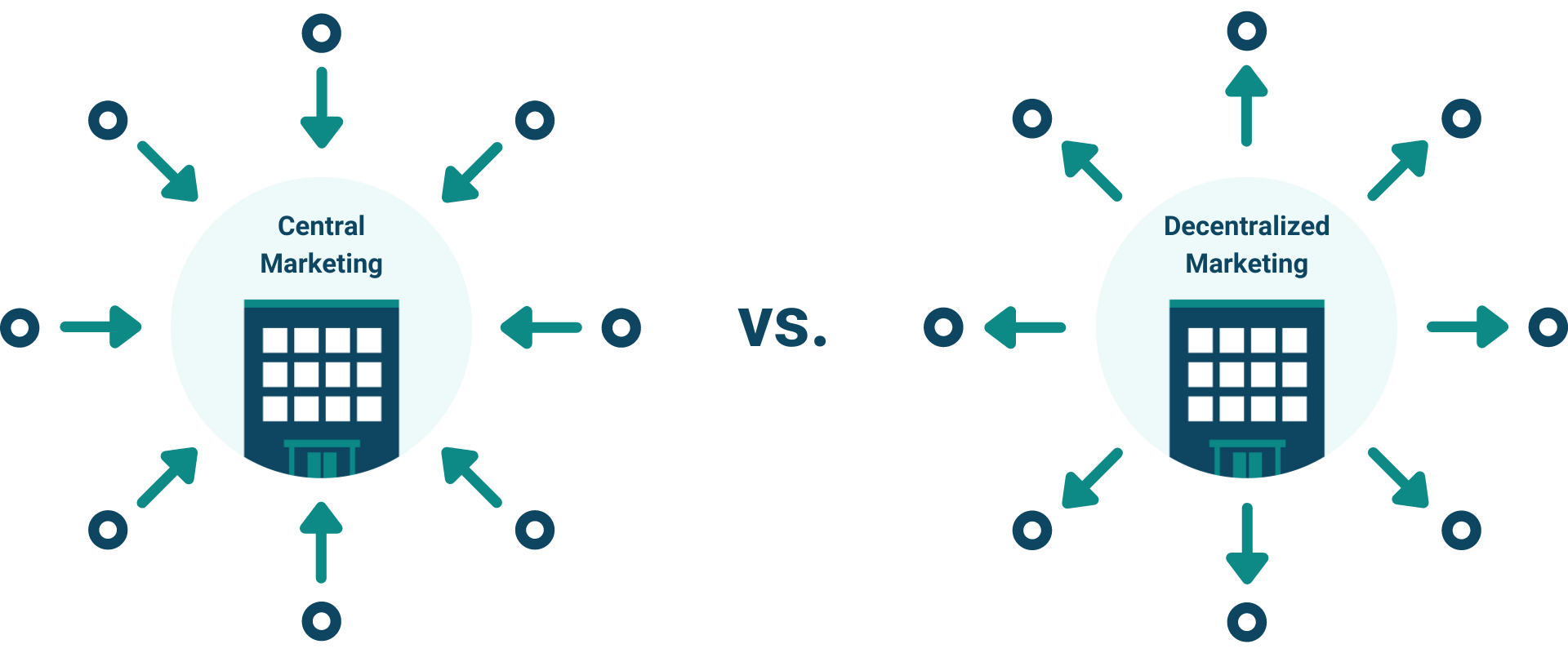Bleiben Sie auf dem Laufenden!
Melden Sie sich für unseren monatlichen Newsletter an und verpassen Sie keine Neuigkeiten zu aktuellen Marketing-Themen mehr.
Decentrally organized companies are companies
a brand that is in different locations
act independently.

Decentralized companies are companies of one brand that operate independently at different locations. This can best be visualized using a sales landscape - in the middle is the headquarters, which makes all general decisions for the brand and forwards them to the local entrepreneurs. Every further building on the map leads through road connections to such a local sales or distribution partner, who usually has relatively great freedom in managing its location. Nevertheless, there are regulations that are passed on from the head office to each decentralized location, which creates a uniform corporate image despite the geographical spread.

The question of whether a centralized or decentralized marketing structure is right for a company or organization depends in large part on how the company is structured in general. In companies with a high degree of centralization, decision-making powers usually lie with central management. This provides the important guidelines for the products, management and responsibilities. This results in simple control and coordination of the individual activities, but decisions that only affect parts of the company can take a long time.
In addition, through the expansion of a large headquarters, the proximity to the customer is lost among the decision-makers and the company runs the risk of making decisions that are too unrealistic. The decentralized corporate structure, on the other hand, offers many independent business units that make their own strategic decisions, while the head office only plays a coordinating role. Astrong decentralization thus enables quick adjustments to the local market and a higher motivation of the sales and distribution partners*, since they are given more responsibility.
However, it can occasionally happen that decision-making competencies are not clearly distributed. This distinction also carries over to marketing. In decentralized marketing, the centrally organized marketing department only plays a trend-setting role; the competence ultimately lies mainly at the local level.
Decentralized marketing is relevant for all companies that are organized decentrally but still receive guidelines for their local marketing from the head office. Areas in which this predominantly applies are:
Since all of these industries and corporate structures live from being represented in many different locations, but still want to appear as a uniform brand, it is very important to operate centrally controlled but locally adapted decentralized marketing.
In this whitepaper you will find 10 reasons.
Due to the ever advancing digitization, the expansion of online and globalization, the world in general is increasingly networked and connected with one another. The Internet not only enables friendships across different regions or continents, the corporate and working world is also adapting to this trend.
Location-independent work and projects that operate across different locations of a company are increasingly becoming part of everyday life. So also in marketing. With online marketing becoming cheaper and cheaper, many different channels and platforms can be used.
In addition, many companies are no longer represented at a single location, but are becoming more and more decentralized. However, these individual local partners* should still implement a uniform marketing strategy. To make this possible, they too need constant exchange and good networking.
Remote work
Networking through the internet and social media
Customizable (online) marketing
In the case of decentralized companies in particular, the question often arises to what extent the marketing campaigns can be adapted locally in order to still leave a uniform brand appearance. Should all locations pull together or should everyone fight for themselves? The brand itself should of course be known nationwide and evoke a clear brand image. However, products and services are mostly bought locally. The local sales partner must therefore also be able to be found by the customer (especially online).
In this dilemma, companies have to decide for themselves to what extent they give their various locations a free hand. General decisions, such as running your own account on social networks (or other services online), must be made by the head office. Some big brands like Apple or BMW, for example, only operate one corporate account, while others let their sales partners* decide for themselves whether they want to use this platform for themselves. The head office also provides guidelines for the correct use of the corporate design. This compliance and the right balance between centrally controlled and individually can benefit in particular from decentralized marketing.

In decentralized marketing, the requirements are changing more and more rapidly, especially due to digitization, and the processes are becoming faster, more networked and more technical. The target groups that are addressed with marketing in general and the individual campaigns are becoming more and more demanding and more informed than before.
This means that marketing has to be more innovative, direct and target group-oriented. In addition to this external pressure, companies and local partners* are also exposed to enormous internal cost pressures. More and more campaigns should be carried out, which ideally cost less and less.
All of this should be done in the decentralized structure at the local level. Here, however, some of the employees do not have in-depth marketing knowledge. That and the international mergers of large companies make it more and more difficult to deliver efficient, decentralized marketing.
In retrospect, the question of whether marketing success can be measured in general still remains open.
By using a marketing portal all these functions such as the communication software, integrating databases using interfaces and sharing information can be taken care of in one management system. It is also possible to provide the individual campaigns and marketing materials here and make them customizable for the respective partners*. By adapting the marketing materials in the system, the corporate design of the company is automatically preserved. Nevertheless, the local sales partners* at the various locations can adapt the materials in such a way that they are most successful for their customers (local marketing). In addition to the fixed templates that are already created in the corporate design of the company, marketing portals usually also offer the possibility of publishing a brand guide to refer to all important design guidelines. Thus, especially in decentralized marketing, a marketing portal is a successful overall concept that significantly simplifies the work of the marketing partners* and the head office.
To simplify the exchange between the head office and the local sales and distribution partners*, a uniform communication software is recommended. This can be used for consultations or for general information to be forwarded to everyone involved in a simple and structured manner. A uniform system offers the advantage that communication always follows the same scheme and is regulated. In addition, past exchanges of information can be easily traced back and used for any queries. Another advantage of communication software would be to give the partners* the opportunity to exchange ideas with each other. This enables them to talk about the current situation in their area and general challenges and to create solutions together. Ideally, this exchange should be easy and without additional effort. This is guaranteed by a uniform company-wide communication software.
Efficient working methods at different locations and with different contact persons also means that, if possible, everyone has the same access to the existing systems in order to enable the same initial situations for all local sales and distribution partners*. Interfaces lead to the fact that the established systems can be consolidated and thus as little restructuring and user training as possible is required. The use of interfaces therefore means that the individual systems, such as databases and communication systems, can be combined and used in an integrated manner. This makes the work of all partners* easier and gives them direct access to the connected systems. Work steps such as importing data and copying from different systems are no longer necessary. This means that work can be carried out particularly efficiently and error-free at all locations.
In decentralized marketing, it is important to offer all local partners* access to relevant customer data and product information that is important to them. By using and maintaining Customer Relationship Management (CRM) and Product Information Management systems (PIM), this data and information can be released to the responsible employees in a simple and structured manner. These central databases form the complete information overview of the company. In order to be able to access certain information in the future, local sales partners* do not first have to inquire at the head office, but can access the data and media at any time. This means that each location can be provided with the same basis for the data. This generally leads to a very time- and cost-efficient way of working, in which more authority is attributed to the individual locations. Especially in decentralized marketing, these management systems offer the possibility of making images and media files available and storing customer data centrally for the entire company or organization.

Melden Sie sich für unseren monatlichen Newsletter an und verpassen Sie keine Neuigkeiten zu aktuellen Marketing-Themen mehr.